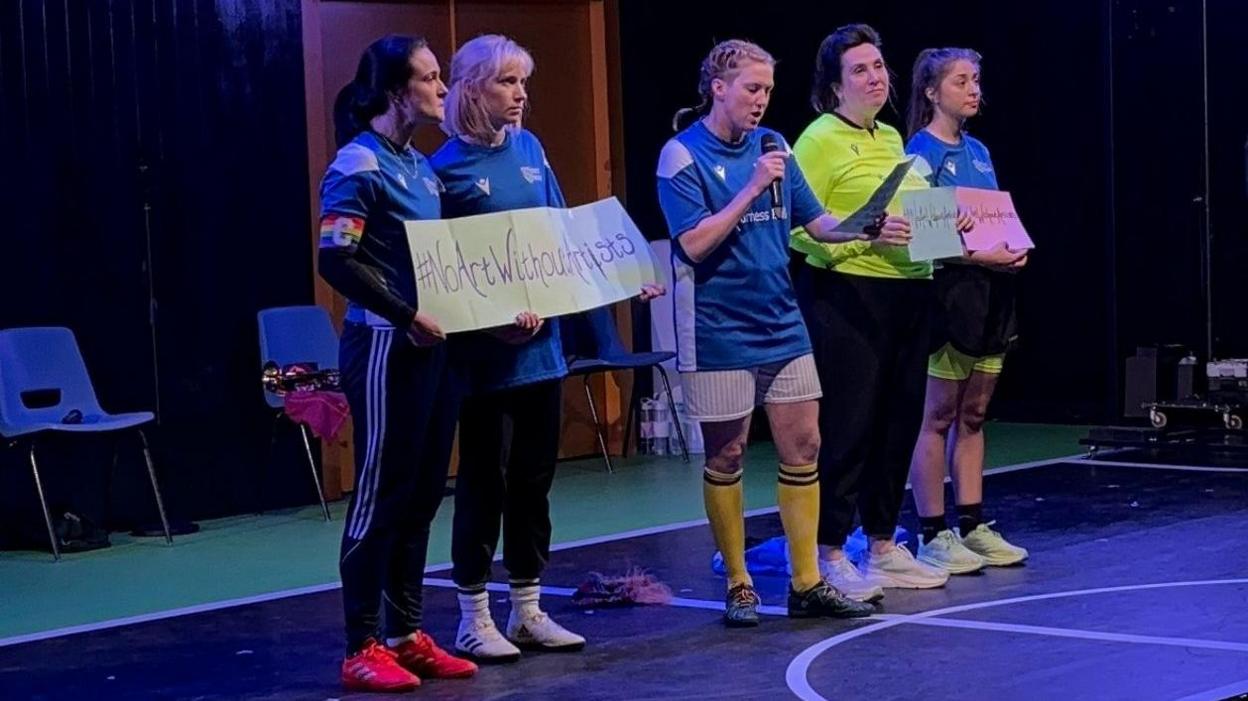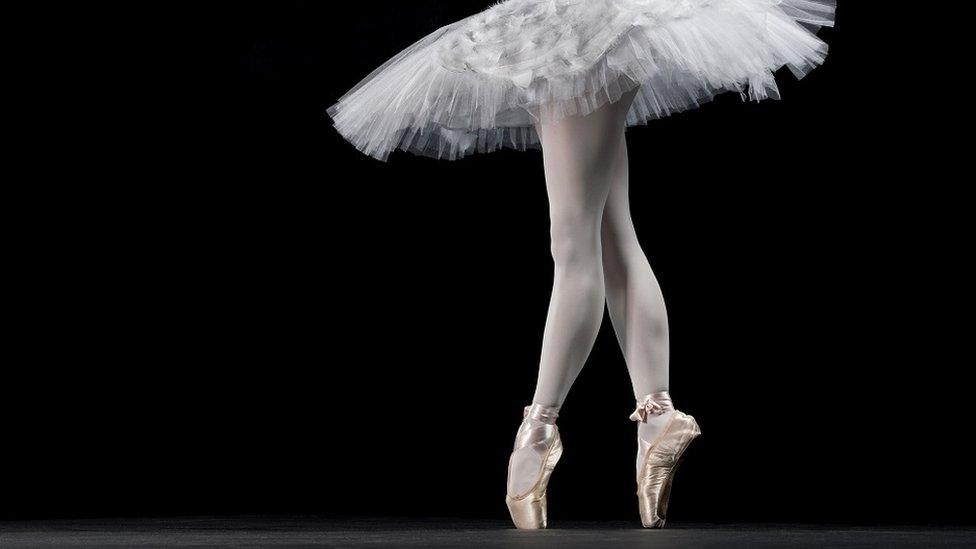Artists call for funding as Edinburgh festivals close
After a performance of The Fifth Step, director Finn den Hertog asked the audience to support artists in Scotland.
- Published
Performers have called for a major grant for artists to be reinstated as the Edinburgh Fringe Festival came to a close over the weekend.
Last week Creative Scotland confirmed it had closed its Open Fund for Individuals over concerns about Scottish government budgets.
The arts body said uncertainty over millions of pounds of government support had created “critical problems” for the grant which supports artists creating new work.
The Scottish government said it provided significant funding to Creative Scotland each year and would continue to do so.
It comes less than a year after a £6.6m budget cut was reimposed despite being reversed earlier in 2023.
Scotland's budget is under significant pressure and ministers have been ordered to constrain all but essential spending to help pay for public sector pay deals.
In a open letter Shona McCarthy, chief executive of the Edinburgh Festival Fringe Society, said 2.6 million tickets had been sold during the festival and 3,746 shows were registered.
But she warned that "the fragility of the performing arts community is palpable" due to government cuts and said the festival needed to be "protected for the future".
Arts funding halted over government budget cut
- Published19 August 2024
Campaign demands arts funding to avert 'cultural catastrophe'
- Published21 August 2024
Ms McCarthy said: "If the UK continues on an upward trajectory of cuts to arts education, and Scotland continues to decimate investment in the sector, breaking promises of support, then we are on a direct course to job losses, exclusion and boring art that is only the privilege of those who can afford to be part of it, as performers or as audiences."
She said the Fringe 2024 had been "brilliant", but added: "The dominant message as we close this year’s festival is that there is no Fringe without art. There is no art without artists."
Francesca Hegyi chief executive of the Edinburgh International Festival, told BBC Radio's Good Morning Scotland that the culture industry was in an "incredibly precarious" position.
"We get it, there isn't a lot of money out there," she said. "Our particular festival has been on standstill public funding for 17 years, so it isn't like we haven't cut already.
"All of us in the cultural sector have really cut to the bone, there isn't anymore to cut.
"I think what you'll see in the next few months is a dismantling of the sector unless somehow we are able to increase the amount of public spending."
After working in the arts industry for nearly 30 years, Ms Hegyi said she "had never known it this bad".
"We're ten weeks out from the start of our new financial year and we don't know what our budget is for next year," she said.
"So it makes it incredibly difficult to plan, but perhaps more importantly, festivals like ours rely on a really healthy cultural sector in Scotland.
"We need artists and freelancers and theatres and companies up and down the country to be there and be successful. It's a real worry that funding for the arts is so fragile at the moment."

The actors behind Same Team spoke out against cuts to arts funding
She noted that Scottish government ministers had committed to invest an additional £100m to the arts budget by 2028/29.
"And this represents 0.17% of government budget," she added.
"So if Scotland really can't afford that then I think that's a real shame because the rest of Europe spends about 1.5% on culture so we are really, really lagging behind here."
Funding cuts felt 'immediately'
Tony Mills, artistic director of Scotland’s national centre for dance, - Dance Base - said closing the fund would have a "massive impact" on dancers.
"I can't stress enough how important that fund is for sustaining an artists' practice and their career," he said.
"Many, many projects I've done have been sustained and made possible through that fund.
"If the fund isn't reinstated, that's just it really - until something else is done. It'll just stop and there will be no production."
He said the effect will be felt "immediately" by independent artists.
Despite the funding cuts, Ms Hegyi said she believed the new tourist levy could help to "bolster" some of the infrastructure around the festivals.
But she said transport services should plan services better to reflect the increase in the number of people in the city throughout August.
About 125,000 people visited the International Festival and over 100,000 visits were recorded at the book festival during the festival season.
The Scottish government said it already provides significant funding to Creative Scotland each year and will continue to do so.
A spokesperson said: "The culture secretary is in regular contact with the sector to discuss the issues it currently faces and how to address those challenges. We will continue to do everything within our powers and resources to protect our world class arts and culture sector.
"We have increased arts culture funding this year, as the first step to achieving our commitment to invest at least £100m more annually in culture and the arts by 2028-29.
"We are considering the implications of the actions announced by the Chancellor on 29 July for our public finances, and the next steps required by the Scottish government."

There are many ways to judge the success of the Edinburgh festivals.
For some, it’s the numbers. About 2.6 million tickets issued at the fringe and 100,000 visitors at the book festival to 600 events - 100 of them sold out.
And 21 premieres at the Edinburgh International Festival with 125,000 attendances.
It’s a vital platform for UK and international companies, with the beginnings of a show.
Fleabag, Six and Baby Reindeer all started life at the Fringe.
But the outward veneer of success at this year’s Edinburgh’s festivals has been tarnished by a row over funding.
Last week Creative Scotland announced plans to close its Open funding pot by the end of the month.
They say a cut made by the Scottish government meant they could not guarantee funding to new applicants.
The “artists” affected are many of the same actors, comedians, singers, musicians and technical staff who’ve given their heart and soul to work at the festivals in the last few weeks and many of them used the curtain call at their final performances to call on the government to reinstate the open fund, and to make good their pledge to increase funding for the sector.
Without it, they warn, there will be inevitable job losses and closures.
The curtain may have come down on this year’s festivals, with no clear idea of what funds they’ll receive for next year despite having to begin planning in just ten weeks time.
But the campaign to remind the world that art can’t happen without the artists, will continue, with a mass rally outside the Scottish Parliament on 5 September.
- Published28 September 2023

- Published31 October 2022
